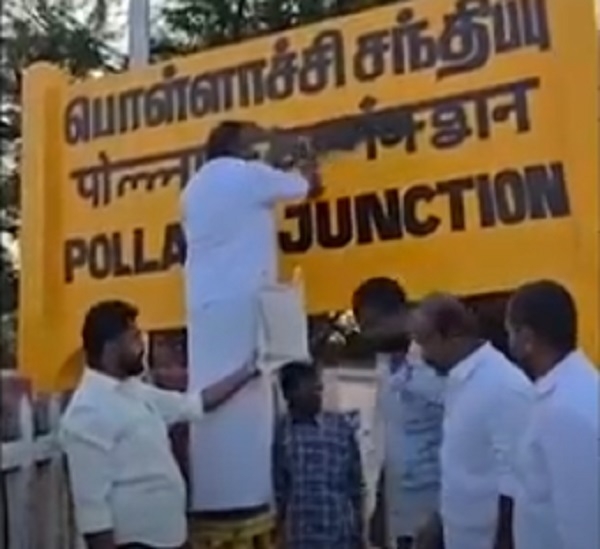
By Dr. R. B. Chaudhary
It is sad and shocking way of protest against national language. An incident occurred on Sunday, 23rd pro-Tamil activists in Pollachi, Tamil Nadu, blackened the Hindi words on a railway station nameboard, amidst an ongoing language row. The activists painted black over Pollachi Junction written in Hindi, but officials quickly restored it. The Railway Protection Force (RPF) identified the activists and registered a case under the Railways Act, stating they will be prosecuted.
This incident is part of a larger controversy, with the ruling DMK in Tamil Nadu accusing the Central government of imposing Hindi through the National Education Policy (NEP 2020). The DMK has been engaged in a war of words with the BJP, denying the charge. The Hindi protest in Tamil Nadu has been a longstanding issue, with its roots dating back to the early 20th century. The protests have been driven by a desire to protect Tamil culture and language, with many Tamils viewing Hindi as a threat to their identity.
According to history of the protests, the Indian National Congress introduced compulsory Hindi teaching in schools in 1937, sparking widespread protests in Tamil Nadu. The protests were led by Periyar E. V. Ramasamy and the Justice Party, who opposed the imposition of Hindi on non-Hindi speaking states. 1,198 protesters were arrested, and 1,179 were convicted during the 1937-1940 agitation. The largest anti-Hindi imposition agitations occurred between 1948-1950, with widespread protests and strikes. In 1965, anti-Hindi riots broke out in Madurai, resulting in the deaths of about 70 people.
The Hindi protest in Tamil Nadu remains a contentious issue, with the DMK and other parties continuing to oppose the imposition of Hindi on non-Hindi speaking states. While the Indian government has made efforts to promote Hindi as the official language, the protests have ensured that English remains an official language alongside Hindi.
The reality of the Hindi protest in Tamil Nadu is complex, with both political and cultural factors at play. While some argue that the protests are driven by a genuine desire to protect Tamil culture and language, others see it as a means for political parties to gain mileage. In a study, find out that 71% of respondents in the 18-25 age group opposed the imposition of Hindi, according to a survey by the Centre for Policy Studies. 63% of Tamil Nadu residents aged 18-24 believed that Hindi should not be made compulsory in schools, according to a survey by “YouGov”.
The necessity of Hindi language in Tamil Nadu is a topic of ongoing debate. While some argue that knowing Hindi can increase job opportunities and facilitate business and trade interactions, others see it as a threat to Tamil culture and language. As per latest data, 60% of India's population speaks Hindi, making it an important language for communication. AS per current scenario, 40% of Tamil Nadu's population has some knowledge of Hindi, according to the Language department report.
Several apps and online platforms, such as Duolingo, Italki, and Preply offer Hindi language courses and have seen significant downloads and engagement in India, including Tamil Nadu. Additionally, some apps, like Ling and Drops, provide interactive and gamified lessons to learn Hindi, which might appeal to Tamil Nadu's younger population.
Ultimately, the decision to impose Hindi on Tamil Nadu or not is a complex one, with various factors at play. However, one thing is very clear t that the people of Tamil Nadu, especially the young generation, are not interested in language politics and they are very keen in learning Hindi as the most speaking language which has now been a commercial language.
It is sad and shocking way of protest against national language. An incident occurred on Sunday,23rd February 2025 , pro-Tamil activists in Pollachi, Tamil Nadu, blackened the Hindi words on a railway station nameboard, amidst an ongoing language row. The activists painted black over Pollachi Junction written in Hindi, but officials quickly restored it. The Railway Protection Force (RPF) identified the activists and registered a case under the Railways Act, stating they will be prosecuted.
This incident is part of a larger controversy, with the ruling DMK in Tamil Nadu accusing the Central government of imposing Hindi through the National Education Policy (NEP 2020). The DMK has been engaged in a war of words with the BJP, denying the charge. The Hindi protest in Tamil Nadu has been a longstanding issue, with its roots dating back to the early 20th century. The protests have been driven by a desire to protect Tamil culture and language, with many Tamils viewing Hindi as a threat to their identity.
The necessity of Hindi language in Tamil Nadu is a topic of ongoing debate. While some argue that knowing Hindi can increase job opportunities and facilitate business and trade interactions, others see it as a threat to Tamil culture and language. As per latest data, 60% of India's population speaks Hindi, making it an important language for communication. AS per current scenario, 40% of Tamil Nadu's population has some knowledge of Hindi, according to the Language department report.
Several apps and online platforms, such as Duolingo, italki, and Preply, offer Hindi language courses and have seen significant downloads and engagement in India, including Tamil Nadu. Additionally, some apps, like Ling and Drops, provide interactive and gamified lessons to learn Hindi, which might appeal to Tamil Nadu's younger population.
Ultimately, the decision to impose Hindi on Tamil Nadu or not is a complex one, with various factors at play. However, one thing is very clear t that the people of Tamil Nadu, especially the young generation, are not interested in language politics and they are very keen in learning Hindi as the most speaking language which has now been a commercial language. (Author is Associated with Hindusthan Samachar as Tamilnadu State Representative)
---------------
Hindusthan Samachar / Dr. R. B. Chaudhary








